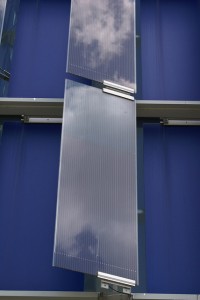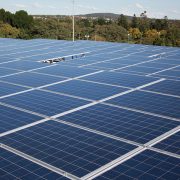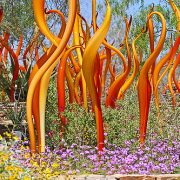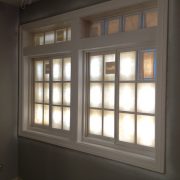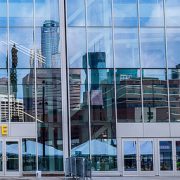Photovoltaic glass rises to the top
Designers are looking for ways to reduce energy consumption in commercial spaces, and photovoltaic glass is emerging as a viable solution. Photovoltaic glass converts sunlight to electricity, and is increasingly being used to reduce energy commercial energy demands.
Apple recently announced that it will install a photovoltaic glass floor into its San Francisco retail store. The floor is able to generate as much as 90,000 kWh of electricity annually. The company’s new headquarters are also fitted with photovoltaic glass, and is expected to generate an eye-popping 5 MWh of electricity each year.
Photovoltaic glass coatings and films increase solar efficiency
The efficiency of photovoltaic glass is generally below 20%, but new research is improving the efficiency of glass, and making effective solar installations possible in more locations. Heliatek, a German manufacturer, has just completed the second phase of a large solar project in Singapore, using HeliaFilm, a film intended to collect solar energy on building façades and rooftops. The film is designed specifically for use in Asia, as a way to boost energy collection and meet growing demands in urban areas. The installed film currently covers about 200 square meters of space and generates about 110kWh of electricity. A third stage, which will apply transparent films to the existing collector.
Other research aims to improve the transparency of photovoltaic glass. Typically, photovoltaic glass is dark – nearly opaque – to improve the collection potential of glass. A new approach to photovoltaic glass involves taking advantage of the large amount of glass surface available in modern commercial buildings. If films or other coatings could improve the efficiency of energy collection and the transparency of glass, solar energy could support a significant portion of the energy that each building consumes.
Another approach to reducing energy costs is to discourage solar heat gain. Coatings like paint can accomplish this. Glassprimer™ glass paint creates a permanent bond with the surface of the glass, and resists UV radiation. At the same time, the paint can permit natural light transmission.
If you’d like more information about Glassprimer™ glass paint, please visit the rest of our site. If you’d like to purchase Glassprimer™ glass paint, please visit our online store .
Photo Credit: Thomas Brown, via Flickr.com

